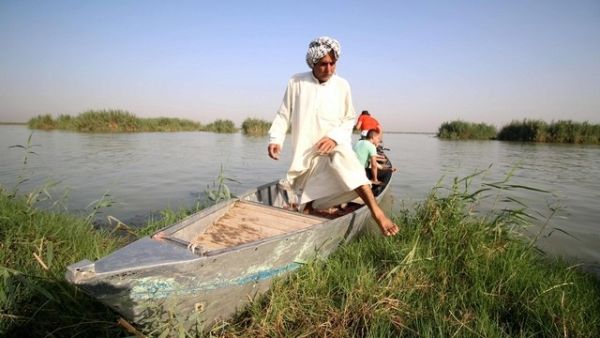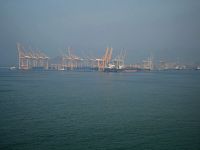Yesterday, the United Nations Educations, Scientific, and Cultural Organization declared the marshlands of Southern Iraq to be a “World Heritage Site” to the jubilation of many Iraqis who live in the war-torn nation’s southern regions.
The Iraqi Marshlands, also known as the Al-Ahwar Marshlands, were once home to over a half million “Marsh Arabs” (Ma'dan in Arabic) who made their living in the flooded lowlands through fishing and agriculture. After anti-Saddam Hussein rebels used the marshes as a hide-out from the former Iraqi leader and as smuggling routes to neighboring Iran, Hussein began diverting the Tigris and Euphrates rivers away from the Al-Ahwar Marshlands.
The results were destructive for the Midan peoples, who were forced to flee the region as the marshlands dried up, shrinking to less than 10% of its original 7,770 square mile area. Today, there remain only 20,000 Marsh Arabs living in Al-Ahwar, and even they are threatened by unnatural salination of water that makes the fishing and rice farming they rely on a daily struggle.
The recent UNESCO ruling will have international implications, as the United Nations will now be able to implement special protocols that can guarantee the marshes’ protection. This is bad news for Turkey and Iran, who will now be required by the UN to cease diverting waters that naturally run into al-Ahwar into Turkish and Iranian agricultural projects.
One supporter of the ruling is the Iraqi Prime Minister Haider al-Abadi:
رئيس مجلس الوزراء دكتور حيدر العبادي يهنئ الشعب العراقي بانضمام الاهوار ومواقع اثار عراقية الى لائحة التراث العالمي pic.twitter.com/rdSO6n7MBi
— Haider Al-Abadi (@HaiderAlAbadi) July 17, 2016
“The Iraqi Prime Minister Haider al-Abady congratulates the Iraqi people on the addition of the al-Ahwar Marshlands and its archeological sites to the UNESCO World Heritage list.”
Finally Unesco Has Accepted2Join Iraq'sMarshes&Heritage Within Global Heritage List
#الاهوار_الى_التراث_العالمي pic.twitter.com/jm8AvD1GO5— Baidaa (@B90B2B10) July 17, 2016
#الاهوار_قضيه_عراقيه
— 5azrajiyaأنصاريه#EHS (@5azrajiyaEhs) July 17, 2016
Iraq Mesopotamia source of heritage and originality pic.twitter.com/CRHly3xROm
.
— ✌سيد كاظم الموسوي✌ (@Sy__Krt) July 17, 2016
.
.
.
اهوارنا اثارنا نافذتنا نحو التراث العالمي
.
.
. #الاهوار_قضية_عراقية
#لتكول_اني_معليه pic.twitter.com/t8urSlv4QA
“Our marshes and historical sites are our window to world heritage.”
The ruling is being seen as a victory for a people who have seen many of their archaelogical sites destroyed at the hands of Daesh (ISIS) and other militant groups in recent years.







